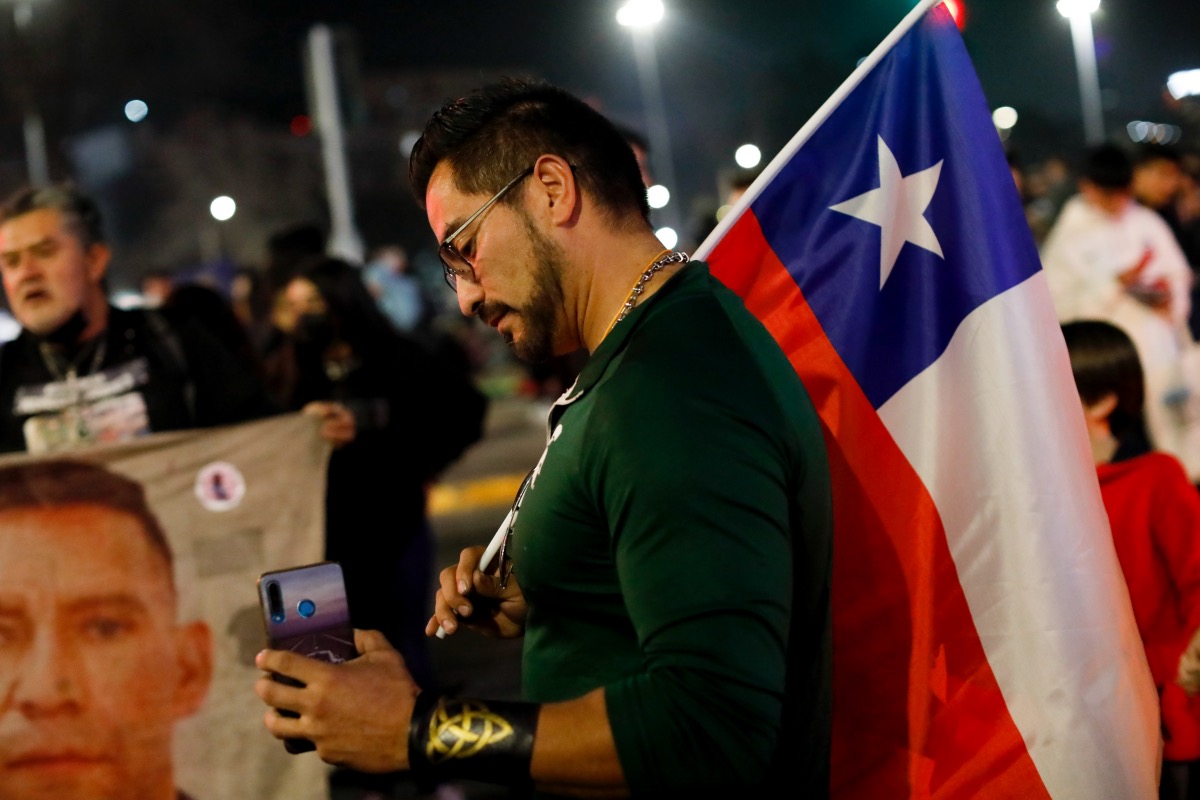

An opponent of the new constitution listens to the partial results of a plebiscite on whether the new constitution will replace the current Magna Carta imposed by a military dictatorship 41 years ago, in Santiago, Chile, Sunday, September 4, 2022. (AP Photo/Cristobal Escobar)
SANTIAGO, Chile — It has been two weeks since Chile’s historical plebiscite for a new constitution, in which voters had the option to “Approve” or “Reject” the proposed document. With a participation rate of about 85 percent —though voting became mandatory this year— an overwhelming majority opted to reject the new constitution.
The preliminary results show that almost 62 percent (7,882,958 votes) rejected the proposal and more than 38 percent (4,860,093 votes) approved the proposal, thus forcing Chile to keep the controversial constitution written during Gen. Augusto Pinochet’s dictatorship in the 1980s.
The proposal for the new constitution contained many progressive elements, such as water access rights —Chile’s water sources are currently privatized— universal education and healthcare, children’s rights, the right to housing, LGBTQI+ rights, and a woman’s right to a life without violence.
The Constitutional Convention that drafted the document was not without controversy. One of its members was removed after he faked having cancer to cover up another illness. Another member took a shower during online voting, while Chile’s mainstream media, always looking to boost ratings by whatever means, focused more on such scandals than the actual proposals for our new constitution.
“Our” is a strong word, and rightfully so, considering this proposal would have been Chile’s first democratic constitution and would have made Chile a social democratic state. Not to mention that all public positions would have been “partiarios,” meaning the gender makeup of official offices would’ve been mandated at 50/50 between men and women.
Since the constitutional process began in 2019, the mainstream media, the business sector, and the right-wing have done everything to sabotage the process by using fake news and scaring the public into believing that any change would mean a disaster for Chile and its economy specifically.
There are a number of reasons why the proposed constitution was rejected by a majority of Chilean voters.
Many did not read the full proposal, despite an effort made by Gabriel Boric’s government and various social movements to spread accurate information. In the end, however, many people received their information through mainstream media and, worse, social media, where there is no control over the information that is shared..
There were rumors, for example, that people convicted of homicide would be able to hold positions of power, or that the State would own all housing (due to the proposed article that would have guaranteed housing for everyone), or that pensions would not be inheritable (even though, currently, only one family member can inherit the pension of a deceased loved one), or that everyone would have to use the public health system (keeping in mind that the Chilean public health system is currently underfunded and understaffed, especially outside the capital).
There were even rumors that people with extra space in their homes would have to house strangers, or that the State would take away small businesses. Such misinformation contributed to scaring people away from change.
Ciper Chile, a nonprofit alternative media outlet, reported on why many working-class Chileans voted against a constitutional proposal that would have improved their lives. Of the 120 santiaguinos surveyed by the Ciper Chile —all of them having voted to reject the proposed constitution— 29 mentioned a fear of government appropriations of homes, the most common reason given.
Twenty-one respondents said they opposed the proposed rights that would transform Chile into a plurinational state, like neighboring Bolivia.
The third most common reason given by respondents, tied at 20 a piece, was split between the fear that pensions would no longer be inheritable on the one hand and criticisms of President Boric or his government on the other.
The fears inflamed by misinformation aside, the “Approve” campaign was not as strong as it could have been. In many cases, supporters were forced to deny false rumors created by the Right.
Another factor is that there were people who voted to punish Boric—in Spanish it is called “el voto de castigo.” Chile is suffering high inflation and a rise in crime due to the two years of lockdown during the pandemic, though many people blame the young president sworn into office in March. Since he forcefully supported the new constitution, many Chileans chose to reject it as a show of their general discontent and their specific resentment toward him.
Then there’s the theory posed by PhD student Lautaro Cella and postdoctoral researcher Eli Rau for the Washington Post, that “compulsory voting tilted the scales against the new constitution by boosting turnout among less-interested voters who were more likely to vote for the status quo, and reject the new constitution.”
For his part, President Boric has already begun talks with all political parties to continue with the constitutional process. In 202O, Chile voted to change its constitution, so while this first proposal failed, the process goes on.
Many are calling for elections to comprise another constitutional convention, with the proposal by the right-wing Chile Vamos being that so-called “experts” participate in the writing of the new constitution.
Meanwhile, students have taken to the streets demanding a new convention and that a date is set to start the process again.
***
Benjamín Buendía is a Chilean American based in Santiago and is secretary of the Independent Workers Union of the University of Chile (SITRAHUCH) as well as a member of the Federation of Independent Workers of the Public Sector (UNTTHE).



[…] post Why Chileans Rejected a New Constitution and What Happens Next (OPINION) appeared first on Latino […]
[…] Source link #Chileans #Rejected #Constitution #OPINION […]